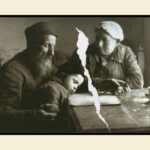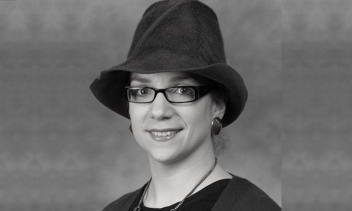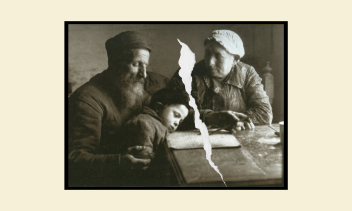Among the piling thoughtful and substantial ideas that never meet the public are words from Rabbi Moshe Benovitz and Rabbi Ron Eisenman in a shelved Jewish Action issue that never made it to print. Its content included a symposium addressing the fractures families find when values begin to clash. In the spirit of Intergenerational Divergence, we dug out the archive.
This past week’s discussion concerned family dynamics and relationships when one child intermarries. When we read the words of Rabbi Moshe Benovitz of NCSY and Rabbi Ron Eisenman of Congregation Ahavas Israel, two would-have-been writers in Jewish Action’s issue, we found their heartfelt sentiments moving and important. The question posed was: How should parents react when confronted by an adult child living with or marrying a non-Jew? Their individual responses are featured below.
‘A Delicate Balance’: Navigating the Relationship
Moshe Benovitz
Even the healthiest and most blessed of marriages are described biblically as “leaving” (Genesis 2:24). But there is a natural course of action that mitigates the intensity of the departure and operates to ensure that leaving does not equal abandonment—and that all who go can, in fact, return.
This is obviously truer and more accentuated when the marriage inherently constitutes rejection and distancing.
Historically, some have acknowledged this and accepted that intermarriage is definitionally (and ironically) a severing of ties. However, many believe that this can never be the case. This approach—that intermarrying can, or should, never inherently sever ties with one’s family—promotes unconditional love in an attempt to preserve the bond.
A relationship can demonstrate unconditional love to an extent that it can withstand monumental disapproval.
Obviously, this debate is critical and has wide-ranging implications for Jewish continuity and the stability of the family unit. It is not clear that anyone has a definitive solution, but for whatever it is worth, multiple modern forces would seem to direct us towards more love and acceptance, not less. But it is possible that with the (appropriate) hyper-focus on these two extreme options—unconditional acceptance and unequivocal rejection—we neglect some nuanced distinctions that can potentially be helpful.
What is the meaning of unconditional love? How is that affection necessarily reflected? More directly, does a commitment to absolute connection demand absolute approval, too? Can acceptance be offered without tacit or explicit sanction? Our children need our love and they thrive on our acceptance and embrace. But we also owe them our opinion and guidance, and we do not need to sacrifice our own ideals on the altar of the relationship we value so deeply.
Is this tightrope act possible? Can we maintain such a delicate balance? And if it is remotely achievable with our child, how would it seem to their new spouse?
It is certainly not easy. But once again, open communication and serious investment into both sides of the equation (the love and the disapproval) can provide an opportunity. It does not have to follow that even the most monumental of decisions serve as a referendum on both of these questions at once.
Without advocating for any particular decision, only speculating about the implications, let us consider: If we choose to attend a wedding, does that necessarily mean we approve? If we choose not to extend an invitation for a Pesach seder, does that mean that we do not love?
Practically, absent any other context or statement, our children will reach their own conclusions about the above. But that does not need to be the only reality. A relationship can demonstrate unconditional love to an extent that it can withstand monumental disapproval. We can explain our actions and decisions in a way that leaves less to the imagination and allows our words to resonate, perhaps over time, as strongly as our actions.
It won’t always work. But it seems unfair and unnecessary to betray either our love or our identity and parental obligations to teach commitment to our people. If there is any chance of remaining faithful to both, we must try.
‘Worth the Effort’: Love and Boundaries in Hoping for Their Return
Ron Eisenman
Writer’s Note: Rereading these words that I wrote so many years ago brings some mixed feelings. The importance of enduring family bonds cannot be overstated and the instinctive desire for parents to remain connected to a child, however much they may stray, is noble and holy. Still, I felt that with more experience and understanding I have sadly seen instances where love does not, sadly, conquer all. There are times when bonds will be severed or should be severed, for a host of reasons. I stand by what I wrote but I think, like all complicated dynamics, individual guidance, support and direction is crucial. Find people in your life with the wisdom, experience, sensitivity, and love to guide you through the heady waters of familial bonds. And may God grant all of us the compassion, strength, insight, and love to remain connected to all those within our families and the larger family of Knesseth Yisroel.
The painful reality of this question is all too vivid to me.
I am currently in contact with the parents of five young men. All were born to frum-from-birth parents. All of them received an Orthodox education through high school. All spent time with post-high school learning in yeshiva in Israel. And all are currently living with—or have already married—non-Jewish women.
The palpable pain of a parent dealing with what was historically regarded as the ultimate betrayal of Judaism is heart-wrenching. Therefore, before we address, “How should parents react when confronted by an adult child living with or marrying a non-Jew?” perhaps we should consider, “How we as fellow Jews should react when we are confronted with the news (gossip?) that so-and-so intermarried or so-and-so is living with a non-Jew?” Indeed, I would argue that the way we as a community react to our friend’s pain when word gets out of the intermarriage and/or living together, will very much impact the first question.
Parents who are obviously emotionally crestfallen and are grappling with self-guilt and embarrassment need to feel supported by their friends. The parents must know they are not alone and that they are not considered pariahs because of their adult child’s choices. If the parents know that the general Jewish community is supportive of them and do not consider them to be parental failures, then perhaps the parents themselves can take a more nuanced approach to their new predicament. If the parents themselves feel rejected and blamed by their community, they will almost invariably attempt in their desperation to either leave their own chevra or ostracize the child, neither of which is often the most effective approach.
However, if any chance of return is possible, the door must remain, if not completely, at least a crack open.
Obviously, each case is unique and each case is complex. Nevertheless, some suggestions from experience perhaps can be helpful. Let’s deal with the cases I have mentioned above.
I am referring to men who were all raised in total Orthodox homes, who completed an average of 15 years of intensive Orthodox Jewish education, and who have continued their studies in a yeshiva in Israel for their gap year. All of them married, or live with, non-Jewish women. I felt strongly that demonizing the non-Jewish woman (at least in the cases I dealt with) was not only ethically wrong, as she did no sin, but it was also counter-productive.
A son who went to yeshiva from Pre-1A and who spent hours in shul and in the classroom certainly knows that his relationship with a non-Jew represents the antithesis of everything Judaism stands for. Therefore, by demonizing the non-Jewish significant other, you will only further alienate your adult child from your life. Threats of ex-communication from the family—which in the past were perhaps more terrifying and an effective means of breaking off the relationship—are nowadays not only ineffective but often will strengthen the adult child’s resolve to live life as he/she wants to. The secular world beckons and entices all. If we have any chance of return, the relationship must be preserved in some form.
Of course, one cannot ignore the halachic ramifications of marrying a non-Jew, and I am not ignoring these painful consequences. I am not advocating for a total acceptance of the couple. Yet, in the cases I dealt with, I neither advocated for a total dissociation nor for an unconditional embracing. The balance between letting your adult child know that you still love them, while simultaneously conveying an unstated feeling of disapproval, is the goal. I would not recommend unconditional love as with the “OTD” child, rather, love still exists, albeit, some new parameters in the relationship must be established. The boundaries of these new parameters are far too complex, unique, and particular, and to attempt to configure them would be reckless and irresponsible on my part. A competent rav and other therapeutic help are mandatory here.
Nevertheless, I am still of the belief that the starting point in the cases outlined above should be to retain at least some contact. Of course, not all who leave return. However, if any chance of return is possible, the door must remain, if not completely, at least a crack open.
How is this accomplished? With tremendous difficulty and finesse. I would never claim to have all the answers, but I know of more than one couple who intermarried and, years later, the non-Jewish spouse converted together with their children.
Abrupt and radical changes in one’s lifestyle, the need for spirituality and religion, the yearning for a mother’s potato kugel, all can be catalysts nowadays for the improbable to become the new reality. Practically what to do is very hard to clearly delineate. However, continuing communication is vital. Rarely will an adult child who has intermarried ever seriously consider returning if they have nowhere to return to. If the parents feel that inviting the couple to the family home would be a tacit condoning of the relationship, perhaps going to a kosher restaurant would be a suitable substitution. Turning the child into your enemy (as with hating the non-Jewish partner) will almost always guarantee losing any hope of return.
How to achieve this balance where your child and their spouse clearly know that the intermarriage has caused and is constantly causing a fracture in the family structure, while simultaneously conveying love for the adult child, is difficult at best. But, nonetheless, in cases where there is even a slight chance of return, attempting to achieve the near-impossible balance between love on one side and feeling betrayed on the other side, is worth the effort.








